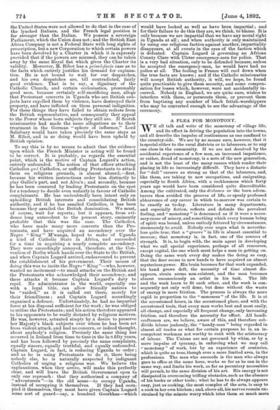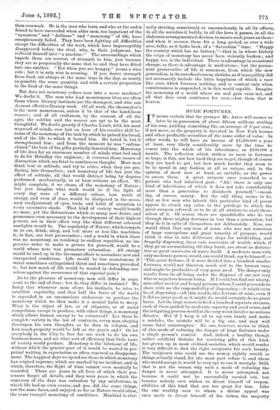A PLEA FOR MONOTONY. -w E all talk and write of
the monotony of village life, and its effect in driving the population into the towns, and all describe the impulse of restlessness as one confined to the country-side. We are by no means sure, however, that it is special either to the rural districts or to labourers, or to any one class in the community. If we are not deceived by the accidental experience of a few men, an increased impatience, or rather, dread of monotony, is a note of the new generation, and is not the least of the many causes which render their placing in life so increasingly difficult. They have a distaste for " dull " careers as strong as that of the labourers, and, like them, are taking to new occupations, and emigrating, especially to South Africa, with a recklessness which forty years ago would have been considered quite discreditable. Among the cultivated, only the déclassé, or the born adven- turers then avoided the grooves of life, or openly professed abhorrence of any career in which to-morrow was certain to be exactly as to-day. Literature in many departments, and especially fiction, reflects and defends the prevalent feeling, and " monotony " is denounced as if it were a neces- sary cause of misery, and something which every human being of spirit was bound, unless entirely fettered by circumstances, strenuously to avoid. Nobody ever urges what is neverthe- less quite true, that a " groove " in life is almost essential to success; that monotony is, in fact, one of the sources of strength. It is, to begin with, the main agent in developing what we call special experience, perhaps of all resources, except capital, the one which most helps a man in getting on. Doing the same work every day makes the doing so easy, that the doer seems to new hands to have acquired an almost mysterious power. His brain becomes for that work expanded, his hand grows deft, the necessity of time almost dis- appears, strain seems non-existent, and the man becomes almost unconsciously an artist in his task. The life and the work learn to fit each other, and the work is con- sequently not only well done, but done without the waste of energy in mere friction. The process is always the more rapid in proportion to the " sameness " of the life. It is at the accustomed hours, in the accustomed place, and with the accustomed tools, that every man works best and most easily, all change, and especially all frequent change, only increasing friction, and therefore the necessity for effort. All handi- craftsmen are, we believe, aware of this, and therefore sub • divide labour jealously, the " handy-man " being regarded in almost all trades as what for certain purposes he is, an in- competent workman not worthy to rank with the aristocracy of labour. The Unions are not governed by whim, or by a mere impulse of tyranny, in enforcing what we may call 0 monotony " of work, but by an experience of centuries, which is quite as true, though over a more limited area, in the professions. The man who succeeds is the man who always goes to office at the same hour, works so far as he can in the same way, and limits his work, as far as pecuniary necessities will permit, to the same division of his art. His energy is not dissipated in overcoming trifling obstacles, such as the absence of his books or other tools ; what he has to do always appears easy, just as cooking, the most complex of the arts, is easy to a cook in her own kitchen ; and, above all, his nerves remain un. strained by the minute worry which tries them so much more
than overwork. He is the man who lasts, and who at the end is found to have succeeded when abler men, too impatient of the " sameness " and "dullness" and " monotony " of life, have conspicuously failed. They have been fighting all difficulties except the difficulties of the work, which have imperceptibly disappeared before the rival, who, in their judgment, has reduced himself into "a machine." The surroundings which impede them are sources of strength to him, just because they are so perpetually the same that he and they have fitted into one another. "Eat when you are hungry," seems a wise rule ; but it is only wise in seeming. If you desire strength from food, eat always at the same time in the day, as nearly as possible the same quantity, and with a certain proportion in the food of the same things.
But does not monotony reduce man into a mere machine? We doubt it. The men who lead monotonous lives are often those whose literary instincts are the strongest, and who can do most effective literary work. Of all work, the shoemaker's is the most monotonous, unless it be that of the hand-loom weaver ; and of all craftsmen, by the consent of all the ages, the cobbler and the weaver are apt to be the most thoughtful. We doubt greatly if Charles Lamb, with his most wayward of minds, ever lost an hour of his creative skill be- cause of the monotony of the task by which he gained his bread, and of the life to which it bound him. He hated it, but it strengthened him ; and from the moment he was "enfran- chised," the best of his gifts partially deserted him. Monotony of life does for an enormous number of minds what bed used to do for Brindley the engineer; it removes those causes of distraction which are fatal to continuous thought. Most men think best in solitude, and try to retire, when they are pro- ducing, into themselves ; and monotony of life has just the effect of solitude, all that would distract being by degrees performed mechanically, or at least without an effort. We might complain, if we chose, of the monotony of Nature ; but just imagine what work would be if the light of every day were of a different colour, how much of energy, and even of time, would be dissipated in the neces- sary readjustment of eyes, tools, and habit of attention to every successive shade. That kind of variety would benefit no man ; yet the distractions which so many now desire, and pronounce even necessary to the development of their highest powers, are in their effect very like what different coloured sunlights would be. The regularity of Nature, which compels us to eat, drink, sleep, and toil more or less like machines, is, in fact, our best preservative ; and a world in which there was no monotony, no tendency to endless repetition, no im- perative order to make a groove for yourself, would be a world whose note was premature exhaustion. All energy would be used up in the incessant effort to assimilate new and unexpected conditions. Life would be less monotonous if water sometimes extinguished thirst and sometimes provoked it ; but how much of life would be wasted in defending our- selves against the recurrence of that especial pain ?
As to the pleasure of monotony, men will differ in argu- ment to the end of time; but do they differ in instinct ? We fancy that whenever man obeys his instincts, he tries to establish regularity, and that half the force of the world is expended in an unconscious endeavour to produce the monotony which we then make it a mental habit to decry. What is the object of law, or of etiquette, or of social compulsion, except to produce, with other things, a monotony which allows human energy to be conserved ? Let there be c3mplete variety in the law of contracts, every man obeying thereupon his own thoughts, as he does in religion, and how much property would be left at the year's end ? Or let everybody in the City be free for one week to fix his own business-hours, and see what sort of efficiency that little taste of variety would produce. Monotony is the lubricant of life, without which the greater part of it would be wasted in per- petual waiting, in expectation as often renewed as disappoint- ment. The happiest days we spend are those in which monotony has reigned supreme, which are marked by no incident, and in which, therefore, the flight of time cannot even mentally be recorded. There are years in all lives of which their pos- sessors forget all details, and they were years in which the sameness of the days was unbroken by any misfortune, in which life had an even course, and you did the same things, saw the same faces, and enjoyed, so far as Nature would allow, the same tranquil monotony of conditions. Mankind is eter- nally striving, consciously or unconsciously, in all its efforts, in all the societies it builds, in all the laws it passes, in all the elaborate arrangements it devises, to secure such years as these ; and when it secures them for a long period, or over a wide area, talks, as it looks back, of a " Saturnian " time. "Happy the country which has no history,"—that is, in whose history the reign of monotony has never been violently broken ; and happy, too, is the individual. There is advantage in occasional change, as there is advantage in misfortune ; but the perma- nent preservative of life is sameness, from which the new generation, in its unreflectiveness, shrinks, as if tranquillity did not necessarily include the little happiness of which a race like ours, which foresees nothing, and is content only when consciousness is suspended, is in this world capable. Imagine the monotony of a world where sin and pain exist not, and all that does exist continues for ever,—but then, that is heaven.



































 Previous page
Previous page